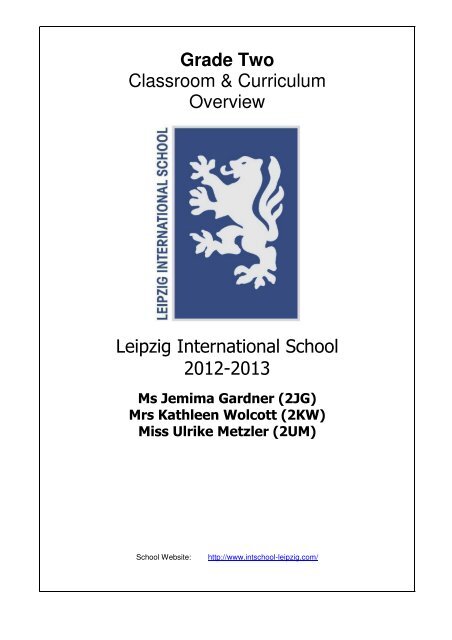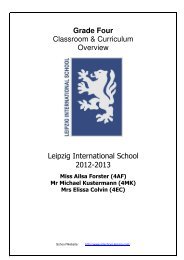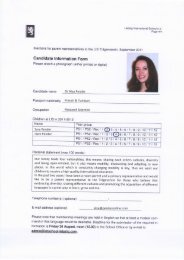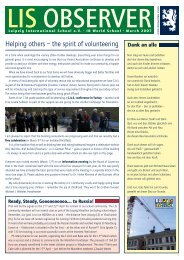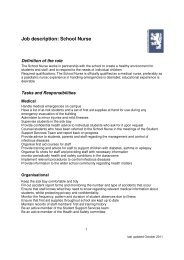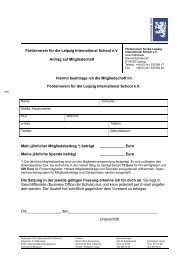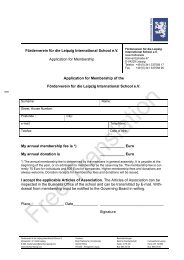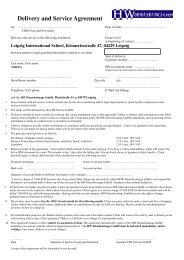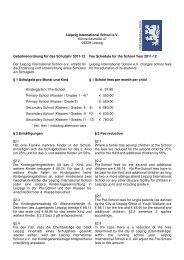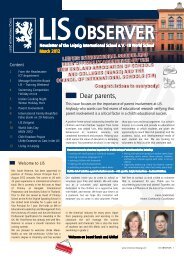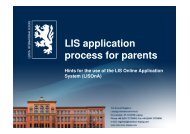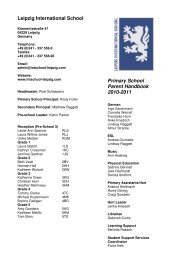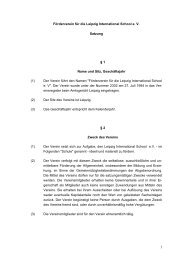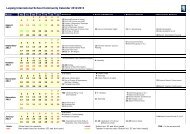(2JG) Mrs Kathleen Wolcott (2KW) Miss Ulrike Metzler - Leipzig ...
(2JG) Mrs Kathleen Wolcott (2KW) Miss Ulrike Metzler - Leipzig ...
(2JG) Mrs Kathleen Wolcott (2KW) Miss Ulrike Metzler - Leipzig ...
You also want an ePaper? Increase the reach of your titles
YUMPU automatically turns print PDFs into web optimized ePapers that Google loves.
Grade Two<br />
Classroom & Curriculum<br />
Overview<br />
<strong>Leipzig</strong> International School<br />
2012-2013<br />
Ms Jemima Gardner (<strong>2JG</strong>)<br />
<strong>Mrs</strong> <strong>Kathleen</strong> <strong>Wolcott</strong> (<strong>2KW</strong>)<br />
<strong>Miss</strong> <strong>Ulrike</strong> <strong>Metzler</strong> (2UM)<br />
School Website: http://www.intschool-leipzig.com/
ROUTINES<br />
Establishing routines for the children and reinforcing them in the class and at home assists<br />
the children to develop and improve their own organisational skills. Please keep this booklet<br />
and refer to it throughout the year.<br />
Arrival: When the weather is fine children should wait outside in Hort. School begins at 8.30am.<br />
Children unpack their bags, place homework folders with home reading books in the set place, as<br />
well as pencil cases, drink bottles and packed lunches. Please remember to notify us IN WRITING<br />
if there are changes in the way your child will be going home from school. Without written<br />
instruction from you we cannot allow your child to go home with a different child’s parent. We<br />
cannot accept verbal changes from your child or a sibling. If your child is not picked up by 15:00 or<br />
14:30 on Wednesdays, we will drop your child off at afternoon HORT. You may pick them up at the<br />
school playground or in the HORT rooms. Please remember to always sign your child out of HORT.<br />
Children's stationery supplies: In Grade Two, the children will have their own pencil case. Extra<br />
supplies will be stored in the classroom and shared amongst the children when they run out. They<br />
will be taking their pencil case to other specialist classes as needed. Therefore it is important that<br />
all they need fits into a pencil case. Sometimes a 2 nd pencil case is necessary to fit their glue,<br />
scissors and pencil sharpener which may not fit into their normal pencil case. A short note will be<br />
sent home if classroom supplies of an item run low. If your child brings their pencil case home,<br />
please encourage them to sharpen their pencils.<br />
Art: Children should bring an art shirt (an old t-shirt or old shirt from a parent will suffice) to school.<br />
This will be kept in the classroom.<br />
Library: Our class library time is scheduled for: <strong>2KW</strong>: Tuesday, <strong>2JG</strong>: Wednesday, 2UM:<br />
Wednesday. Children are permitted to checkout two books each week. Any books checked out the<br />
previous week need to be returned before new books can be taken.<br />
Sport: Our classes’ sport times are scheduled: 2UM - Tuesday, <strong>2KW</strong> - Wednesday and <strong>2JG</strong> -<br />
Thursday. Children should bring sport clothes and shoes to school every week. Sport bags are not<br />
allowed to stay at school because there is not enough space and the clothes need to be washed.<br />
Timetables: All Grade Two timetables will be sent home soon.<br />
Food and drink: It is suggested that the children bring "healthy" food for their snack<br />
and lunch. We do not allow candy, chocolate or soda. Drinks such as water and juice<br />
are the most suitable. During class times children will only be allowed to have plain<br />
water in the classroom. No money is to be provided for buying a snack or drink from<br />
the kitchen or the vending machine.<br />
Home Reading: Children will be taking books home from the classroom. They will be encouraged<br />
to read and change them regularly. The child needs to write in his/her reading log each night. They<br />
need to record the date, the name of book, the page numbers and remarks concerning the book or<br />
chapter. Please encourage them to write more than “I liked the book” as a remark. Some books can<br />
be completed in one evening; some books such as chapter books take longer to read.<br />
Parents' participation in this activity is essential and can include listening to your child read; asking<br />
questions about the story; asking questions about a picture; asking him/her to show you a favourite<br />
picture and tell what is happening; asking about a favourite part; or if it was a good ending to the<br />
story.
Homework Folders: All notes to and from school should be put inside your child’s homework<br />
folder. The homework book, home reading book, yellow home reading log and small library books<br />
should also be kept in the folder.<br />
Children should be encouraged to develop the habit of packing necessary books and items<br />
into their school bags themselves each evening at home.<br />
Homework: Your child is required to read 15 minutes every night and to practice the weekly<br />
spelling words in their homework book in order to remember them. The spelling tests are every<br />
Friday morning. Other homework activities will also be sent home in their homework folder. Even<br />
though a child has completed their homework, they should use the rest of the week to review their<br />
spelling words. Homework books need to be given to the teacher on Friday.<br />
Communication: Communication between parents and teachers can occur via a note in your<br />
child’s homework folder or via email. Here are out email addresses:<br />
Houses<br />
In order to further promote teamwork and to foster a sense of belonging in our expanding school,<br />
LIS Primary runs a House System. Each child is allocated to one of four houses: Mandela, Curie,<br />
de Coubertin or da Vinci (siblings are ‘housed’ together). House activities and assemblies develop a<br />
sense, not only of good sportsmanship but also good teamwork - being an active and valuable part<br />
of a team.<br />
House Points are awarded for a wide range of things both academic and other, both for individuals<br />
and groups. The points are totalled weekly and the winning house is announced at weekly<br />
assemblies.<br />
Behaviour Plan<br />
At LIS we follow the Golden Rules. We review the rules at regular intervals. They form the basis of<br />
our expectations of how we treat each other.<br />
The Golden Rules are:<br />
We are gentle (We don’t hurt others)<br />
We are kind and helpful (We don’t hurt anybody’s feelings)<br />
We listen (We don’t interrupt)<br />
We are honest (We don’t cover up the truth)<br />
We work hard (We don’t waste our own or other’s time)<br />
We look after property (We don’t waste or damage things)<br />
Money<br />
Children should not bring money to school unless it is for a special purpose, i.e. field trips. Please<br />
place all money in an envelope and label it with your child’s name on it, the amount, and what the<br />
money is for.<br />
Field Trips<br />
Throughout the year, we will be taking various trips into the community to enhance our curriculum.<br />
Permission notes will be sent home for each trip. You will be able to volunteer to accompany us<br />
prior to each trip. Parents are chosen on a first-come-first-serve basis, so please return your child’s<br />
permission slip as quickly as possible.<br />
Birthdays<br />
We know how special birthdays are to you and your child. We will recognise birthdays at school<br />
during our snack time. If you would like to send in something special for this time in your child’s life<br />
(cupcakes, cookies, etc.) please feel free! When sending in special birthday treats please keep in<br />
mind we only have 10 minutes to pass out the snack and for the children to eat it. It is up to you and
your child if you would like to send in something for his/her birthday. If you are sending in a cake,<br />
please have it pre-cut. We do not want sharp knives in the classroom. Please check with your<br />
classroom teacher about allergies or dietary restrictions. Please send personal birthday invitations<br />
privately, outside of school.<br />
Room Parent<br />
Each class needs a room parent. The role of this parent is to help the teacher organise special<br />
events when help is requested. Please remember, the role of the room parent does not include<br />
classroom problem solving. Room parents should not ask the teacher questions on behalf of the<br />
other parents. If you or your child is having a problem in the class, please contact the classroom<br />
teacher. This is the proper protocol within the school.<br />
Volunteers<br />
Please contact your child’s teacher if you are interested in volunteering in the classroom.<br />
Responsibilities might include: working with<br />
individual children, working with small groups,<br />
helping the teacher with classroom organisation,<br />
uploading photos onto the Wiki etc...<br />
Curriculum Information – Grade Two<br />
If you would like to learn more about the Grade<br />
Two curriculum, please go to the school website:<br />
www.intschool-leipzig.com/. Here is some general<br />
information.<br />
ENGLISH:<br />
In English the children learn to recognise, read and write in various genres. In addition, children will<br />
be taught to recognise and use grammatical features within the context of the genres they are<br />
studying. Of course we are always working on improving the children’s vocabulary. The genres<br />
covered in Grade Two will be:<br />
Narrative<br />
Stories with Familiar Settings<br />
Myths, Legends and Fables<br />
Adventure and Mystery Stories<br />
Poetry / Plays<br />
Poems / Plays based on observation and the senses<br />
Poems from different cultures<br />
Humorous Poems<br />
Non-Fiction Writing<br />
Instructions<br />
Letters<br />
Non-chronological Reports<br />
Handwriting - The children will learn to write using cursive script from December. Before this we<br />
will consolidate the formation of their printed letters and pencil grip. We will give instruction regularly<br />
in class and children will be given opportunity to practice and will be encouraged to use cursive<br />
writing in their writing books. A sample of the handwriting style is enclosed.<br />
Reading – In addition to home reading, children will work in reading groups in the classroom. This<br />
provides an opportunity for the teacher to hear the children read independently and work on<br />
comprehension strategies. Other reading activities will develop their vocabulary, phonics, spelling<br />
and recognition of high frequency words (words that the children will encounter most often and will<br />
need to be able to recognise by the end of the year.)
Spelling – Children will continue learning English spelling conventions to assist their spelling<br />
strategies. Each week we will focus on a particular sound and children will explore how to spell<br />
using that sound. We will sometimes have review weeks. The spelling words that the children must<br />
learn each week are linked to that week’s sound.<br />
MATHEMATICS:<br />
The focus in Grade Two is building and strengthening numeracy and mental Maths skills learnt in<br />
Grade One. We will be playing games and using concrete materials to help learn additional skills.<br />
There will also be opportunities to apply their knowledge to real life situations. The students will use<br />
a 1cm grid exercise book to help them learn to set out their written work neatly. The general Maths<br />
concepts taught are:<br />
Number<br />
• Place Value: numbers to at least 1000, partitioning, rounding<br />
• Addition & Subtraction: number bonds to 100, develop their own written calculations<br />
• Multiplication & Division: times tables: x1, x2, x3, x4, x5, x10, division with remainders<br />
• Fractions: recognizing fractions, simple equivalence, simple mixed fractions, ordering<br />
numbers, fractions of numbers<br />
Geometry<br />
• 2D & 3D Shapes: characteristics of shapes, nets, symmetry, right angles<br />
• Position: clockwise and anticlockwise, coordinates on a grid<br />
Measure<br />
• Money: totals to 100c, change from 100c, begin to use Euros and cents<br />
• Length, Mass, Capacity: read scales, use a ruler to the nearest half centimetre<br />
• Time: vocabulary of a clock and calendar, analogue clocks to the nearest 5 minutes, digital<br />
clocks to the nearest minute, simple time intervals<br />
Data Handling<br />
• Real life situations: tally charts, frequency tables<br />
• Graphs: pictograms (symbol representing one or two units), bar charts (intervals labeled in<br />
ones or twos), Venn or Carroll diagrams (two criteria)<br />
Problem Solving<br />
• Word problems: single (all four operations), two-step (addition and subtraction only), write<br />
own<br />
• Number problems, puzzles, patterns, simple relationships and general statements<br />
• Strategies to check answers, including estimation<br />
• Oral and written reasoning<br />
ART:<br />
There is a double period of art per week taught by the class teacher. The aim if possible is to try<br />
and complement other subjects being taught. The focus is on the<br />
elements, skills and materials used in art.<br />
Topic areas this year will include:<br />
� Understanding Colour & Investigating Pattern<br />
� Environmental Art/Sculptures<br />
INTEGRATED UNITS:<br />
Each class has 4 periods of Integrated Unit time each week. This could be a unit based on Science,<br />
History or Geography. The topics to be studied are:<br />
SCIENCE<br />
• Flowering Plants<br />
o This unit looks at what plants need to grow well and why it is important that they<br />
grow.<br />
• Materials
o This unit extends the knowledge about a range of materials we use and of their<br />
characteristic properties. It develops ideas as to why materials are chosen for<br />
specific uses.<br />
• Keeping Healthy<br />
o This unit explores different ways to stay healthy through diet and exercise.<br />
• Forces<br />
o This unit builds on previous knowledge of forces and how they can affect the<br />
movement and shape of objects. They will be introduced to friction and magnetic<br />
attraction and repulsion.<br />
• The Senses<br />
o This unit looks at the individual senses and their importance.<br />
• Life Processes<br />
o This unit looks at life processes common to animals and plants. It considers what<br />
makes a healthy diet.<br />
HISTORY and GEOGRAPHY<br />
Geography: Weather around the world<br />
• Continents, countries & major cities<br />
• Basic map skills<br />
• What is weather?<br />
• Why is it different all over the world?<br />
• What activities can you do in what kind of weather?<br />
History: <strong>Leipzig</strong>: A Trip Down Memory Lane<br />
• Oral history: Finding out about <strong>Leipzig</strong>’s past<br />
• What was it like to live in <strong>Leipzig</strong> in the past?<br />
• How has it changed?<br />
COMPUTER/ ICT (Information Communication Technology)<br />
Tommy Clarke will lead the ICT lessons this year, with assistance from the class teacher. In Grade<br />
Two the students start the year by improving their knowledge of the keyboard and improving their<br />
speed and accuracy. They will learn how to communicate messages by using a combination of<br />
graphics and text. They also learn the importance of saving their work. Linking in to the Music<br />
curriculum the children will explore and develop musical ideas by using ICT. The students will use a<br />
database to answer simple questions by sorting the data and using the search functions. They will<br />
also learn how to explore simulations, explore options and to test their predictions. The students will<br />
also use e-mails to send and receive messages.<br />
MUSIC<br />
In Grade Two music we will explore the differences between rhythm and non-rhythm. The children<br />
will revise their rhythmic patterns from last year and experiment with different ways rhythm is made<br />
and heard. They will learn about ways to notate non-rhythmic compositions and soundscapes and<br />
experiment with texture (the number of sounds and instruments in a composition) and dynamics<br />
(loud and soft) with voice, tuned and untuned percussion instruments. Some other highlights of the<br />
year will be preparing for the Lower Primary School concert, and also the unit ‘Weather Music,’<br />
which will link with the Science topic, ‘Weather’.
GERMAN<br />
At LIS we follow a curriculum based on the curriculum of Sachsen. (Adaptations have been made in<br />
order to accommodate the needs of students in an international school with English as the main<br />
language of instruction.)<br />
All children from Grade One to Five have 5 German lessons per week. Reception has 3 lessons per<br />
week. For students whose mother tongue is not German (for example our German beginners and<br />
intermediate learners) German as a Second Language (GSL) classes are provided (Refer to the<br />
GSL section below). Learners at an advanced level join the native speakers' classes.<br />
Three German classrooms and one GSL room provide a specially prepared German surrounding.<br />
(We are about to develop a language programme which respects the needs and develops the<br />
abilities of children in both English and in German.)<br />
One of the guiding principles throughout our whole teaching in the Primary German Department is<br />
Maria Montessori's:<br />
Hilf mir, es selbst zu tun!<br />
Help me to do it myself!<br />
The children learn and practice language in an individual way with different types of resources<br />
(such as Klammerkarten, Logico, Lernkartei zum schriftlichen Üben, learning programs on<br />
CDRoms, Hörbücher, and CDs) that allow them to:<br />
• learn at their individual levels<br />
• work at a pace that suits their learning needs<br />
• repeat cards with difficult tasks as often as they want until they feel safe<br />
• self-manage and self-assess (the child finds the answers on the back of the cards)<br />
• find and use their personal way of learning (by writing, reading, listening...)<br />
• go on without the permanent need for teacher feedback<br />
• take responsibility for their own learning and become independent learners<br />
• see the success of their learning (today I made 8 cards)<br />
• take over as a teacher for other students, who need help in solving a problem<br />
• act with care and consideration towards their classmates (put the cards back in the right<br />
order and place, take only one card at a time etc.)<br />
The approach is not textbook based; we use books only to find poems or stories or just to enjoy<br />
looking at them. We have some "Lesebücher" and "Fibeln" in the classrooms, which the students<br />
read at their own pace.<br />
LIS follows the German curriculum for the State of Saxony. You can find the curriculum by following<br />
this link: http://www.sachsen-macht-schule.de/
WRITING<br />
As another main principle, we show children how to correct their own written work (spelling words,<br />
stories) as a first step, then with or for a partner, when necessary, with the help of a wordbook.<br />
Finally as a very last measure, the teacher takes over, providing hints for corrections. Only stories<br />
we want to display have to be written without any mistake.<br />
READING<br />
To practise reading for comprehension we use mainly different materials that are student controlled.<br />
Whenever possible, the teacher reads books for the children in order to lay the groundwork for a<br />
future where love of books and reading exists or in order to keep the existing love of books burning.<br />
We also have a small, but well used library in the German rooms. We encourage the children to<br />
read or look at whatever books they like and to take books home. There is no "you must read this<br />
book", we want the children to get used to having books and reading them as a natural habit.<br />
EXTRACURRICULAR<br />
At least twice a year we try to visit a theatre play performances. We go for a 40-minute walk to the<br />
"Theater der Jungen Welt", enjoying the play as well as the trip through the park at the back of our<br />
school. Some performances have been "Peter und der Wolf" with Grades One and Two and "Emil<br />
und die Detektive" with Grades Three, Four and Five.<br />
We also try to visit reading sessions with book authors whenever possible. In the past we have met<br />
Paul Maar, Christa Kozcik, Cornelia Funke and others. (Events take place at Buchmesse, <strong>Leipzig</strong><br />
liest, Stadtbibliothek).<br />
Each Grade Two class pays an introductory visit to the main children's library, Stadtbibliothek am<br />
Leuschnerplatz, in order to get over the fear of entering a library. We encourage the children to use<br />
the facilities of the library.<br />
German as a Second Language (GSL)<br />
Generally, if a student’s mother tongue is not German, or if a slight to moderate level of German<br />
language proficiency applies, the student will attend the German as a Second Language course.<br />
The GSL Programme at the Primary School focuses on the 4 language skills (reading, writing,<br />
listening and speaking).<br />
Introduction<br />
Communication in German as a foreign language broadly shares the main skill dimensions of<br />
communication in the mother tongue. It is based on the ability to understand, express and interpret<br />
thoughts, feelings and facts in both oral and written form (listening, speaking, reading and writing) in<br />
an appropriate range of societal contexts — work, home, leisure, education and training —<br />
according to their needs. Communication in foreign languages also calls for skills such as mediation<br />
and intercultural understanding. The degree of proficiency will vary between the four dimensions,<br />
between the different languages and according to the individual’s linguistic environment and<br />
background. At <strong>Leipzig</strong> International School, we offer German as a Foreign Language for all<br />
primary students (five lessons per week for Grade 1-5)<br />
Aims<br />
The aims of the Primary Foreign Language German programme are:<br />
• to enable the student to use the language effectively as a means of practical communication<br />
in speech and in writing within a range of contexts,<br />
• to develop the ability to understand and respond to the language demands in social<br />
contacts,<br />
• to provide the students with a sound linguistic base necessary for further study, work and<br />
leisure,<br />
• to offer some insight into the nature of language,<br />
• to develop an appreciation of Germany, it’s people and it’s language
• to provide the opportunity for enjoyment, creativity and intellectual stimulation<br />
• to encourage the children to learn by playing different games and having fun<br />
ENGLISH AS A SECOND LANGUAGE (ESL)<br />
The ESL Programme at the Primary School focuses on the 4 language skills (reading, writing,<br />
listening and speaking) in a fun and dynamic way. The goal of the programme is to give students<br />
sufficient English to be able to access content and language within the mainstream classroom, by<br />
teaching them in small groups and providing targeted language instruction. The ESL staff use small<br />
group work, projects, drama, games, and a variety of written materials to practice skills and expose<br />
children to English in a pleasurable, focused environment.<br />
While the focus is on language acquisition, class tasks seek to build up linguistic knowledge around<br />
a theme or content area. Students who are new to English attend specialist ESL classes whereas<br />
more advanced ESL students receive a combination of in-class support as well as specialist ESL<br />
classes. This highly-focused instruction utilises texts and themes studied in the homeroom and is<br />
based on the particular linguistic needs of each student, including areas such as spoken fluency,<br />
structuring effective writing, vocabulary development, and grammatical accuracy.<br />
Because of the proven benefits of developing a strong mother tongue, LIS celebrates and aims to<br />
foster growth in all our students’ languages. English language learners are therefore encouraged to<br />
develop their mother tongue while improving their English proficiency. We are happy to meet with<br />
parents to discuss ways to help your child’s language development.<br />
Please note: due to the confusion that ESL learners might have (for students whose mother<br />
tongue is not German), we reserve the right to refrain from providing GSL lessons until a<br />
B1* stage of English language development is reached.<br />
*As per the Common European Framework. For more information, please visit this website:<br />
http://europass.cedefop.europa.eu/en/resources/european-language-levels-cefr<br />
SPORT<br />
In Reception, Grade One and Grade Two students build on their natural enthusiasm for movement,<br />
using it to explore and learn about their world. They start to work and play with other students in<br />
pairs and small groups. By watching, listening and experimenting, they develop their skills in<br />
movement and coordination, and enjoy expressing and testing themselves in a variety of situations.<br />
PRIMARY LEARNING SUPPORT<br />
The Primary School Learning Support Program is designed for students who will benefit from<br />
additional teaching and study to reach the learning outcomes for their grade level. Students are<br />
withdrawn from their regular classrooms for one period, two or three times each week, to work in a<br />
small group setting with the specialist teacher. Sessions are offered in literacy and numeracy;<br />
encouragement, organisational and study skills are an important part of these classes. In addition,<br />
Learning Support assistants work with students within classrooms.<br />
The Primary Learning Support specialist provides academic assessment for students referred by<br />
teachers and parents. These assessments benefit the student by providing further information that<br />
can be used to design programmes to meet the individual needs of students. The Primary Learning<br />
Support specialist also works with classroom teachers to provide information and ideas that will<br />
support the classroom programme. Parents are encouraged to meet with the Learning Support<br />
Specialist to discuss their child’s programme.<br />
Marlene Heitland, Primary Learning Support Specialist


